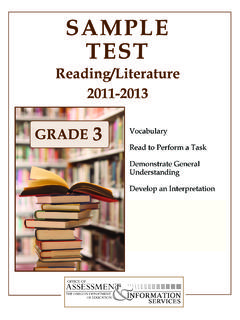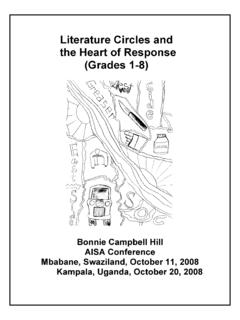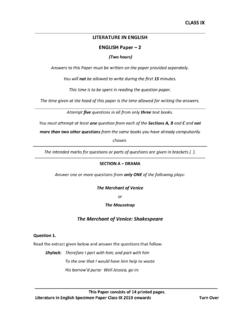Transcription of Why teach literature in the foreign language classroom?
1 Why teach literature in the foreign language classroom? Jonathan Sell Universidad de Alcal . Resumen De vez en cuando, se ha cuestionado la necesidad o el valor de ense ar la literatura en la clase de idiomas. Este art culo repasa y matiza los argumentos a favor y en contra de la ense anza de la literatura y defiende dicha ense anza en base a tres argumentos: 1. la literatura puede favorecer el aprendizaje de idomas en la educaci n primaria puesto que los procesos cognitivos de los ni os est n especialmente capacitados para tratar estructuras narrativas; 2. la literatura, traducida en su caso al idioma objeto de la ense anza, puede proporcionar conocimientos y competencias culturales que permitan a los estudiantes desenvolverse adecuadamente en relaciones con representantes de diversas culturas; 3.
2 Los temas tratados en la literatura pueden resultar m s veros miles y m s relevantes que los temas que se encuentran en los libros de texto. Palabras clave: literatura, adquisici n de lengua, competencia cultural, realidad Abstract From time to time the need or value of teaching literature in the language class has been questioned. This article reviews and qualifies the arguments for and against teaching literature before defending such teaching on three grounds: 1. literature can enhance language learning at primary level since the cognitive processes of young learners are particularly adept at dealing with narrative structures; 2.
3 literature written in the target language or translated into the target language may give learners insight into other non-target language cultures, thus preparing them to act competently and appropriately in future dealings with representatives from those cultures; 3. literature 's contents may well be truer to life and more relevant to learners than typical textbook topics. Keywords: literature , language acquisition, cultural competence, real life 1. The case against literature It is sometimes difficult for teachers and lecturers of literature to justify their professional existence, a difficulty that contributes in part to what literary scholar Elaine Showalter (2002: 1-20) calls the anxiety of teaching.
4 It is therefore understandable that foreign and second language (for convenience, FL ) teachers and lecturers may sometimes find it even more difficult to justify the inclusion of literature in their lesson plans. Some reasons for this difficulty are political. As far as teaching English as a foreign language is concerned, for example, not only are professionals occasionally afflicted by guilty feelings that they are lackeys in the pay of linguistic imperialism, but if they start introducing their students to Shakespeare, Dickens or Ted Hughes they are condemned for cultural imperialism too ( Ngugi wa Thiong'o 1986), not to mention a bigoted reverence for mostly dead white males (see Section 4).
5 Other reasons are methodological. FL teaching should engage with real life and real-life situations; literature conceived of as some sort of aesthetic artefact is not real life , at times not even realistic, and barely relevant to day- to-day living (see Section 5). Similarly, literature is often remote from learners, whether historically, 86. Why teach literature in the foreign language classroom? Jonathan Sell Encuentro 15, 2005. geographically, socially, culturally or linguistically. Meanwhile, under a communicative approach, FL. teaching should favour speaking and listening skills, whereas literature is a matter of reading writing, or writing to be read.
6 Also, teaching literature entails an imbalance of power and work in the teacher-student relationship, for the teacher is more knowledgeable and takes a more dominant role in communicating that knowledge, especially when the piece of literature is used less as a means to an end than as an end in itself, less as a resource than an object of study in its own right. Until recently, a further argument against teaching literature was that new technologies and cultural practices in the high- or post-industrial West had rendered or were on the point of rendering reading and writing hopelessly obsolete. Then Harry Potter came along, UK sales of children's literature increased tenfold, and children themselves became increasingly discerning and demanding readers.
7 literature , it seems, is here to stay, for the time being at least, and particularly in the FL classroom where the global spread of bilingual and immersion education means that pupils are expected to be proficient at reading in a non-native language at ever earlier ages, to the point where in some education systems pupils are even introduced to reading in a second language before they have learnt to read in their first (Johnson and Swain 1997). The question that concerns FL teachers is what to do with literature and, perhaps more importantly, why do anything with it at all. On the occasion of the re-launching of Encuentro, this article is intended as a stimulus to reflection, research and debate on the role of literature in FL teaching.
8 2. The case for literature A welter of reasons for, or benefits of, teaching literature in the FL classroom have been proffered by a variety of authors. For example, Parkinson and Reid Thomas (2000: 9-11) list, with more or less approval, the following ten: 1. Cultural enrichment. Reading literature promotes cultural understanding and awareness. (see also Collie and Slater 1987; Schewe 1998; Sell (ed.) 1995; Silberstein 1994). 2. Linguistic model. literature provides examples of good writing, linguistic diversity, expressive ranges, and so on. 3. Mental training. Better than any other discipline, literature trains the mind and sensibility.
9 4. Extension of linguistic competence. literature stretches the competences of learners who have mastered the linguistic rudiments. 5. Authenticity. literature is genuine linguistic material, not a linguistically contrived textbook (Duff and Maley 1990). 6. Memorability. Because literature , especially poetry and songs, is memorable, it can be a memorised archive of linguistic usage (Maley and Moulding 1985). 7. Rhythmic resource. Poems assist the learner in assimilating the rhythms of a language (Maley and Moulding 1985). 8. Motivating material. literature is more likely to engage with and motivate a learner than artificial teaching inputs because it is generated by some genuine impulse on the part of the writer and deals with subjects and themes which may be of interest to the learner (Duff and Maley 1990).
10 9. Open to interpretation. Because literature is open to interpretation, it can serve as a basis for genuine interaction between learners (Duff and Maley 1990). 10. Convenience. literature is a handy (photocopiable) resource. Lazar (1993:15-9) suggests that literature in the FL classroom motivates, offers access to cultural background, encourages language acquisition, expands language awareness, develops students' interpretative abilities and educates the whole person in so far as it enhances our imaginative and affective capacities (see also Fern ndez 2003: 60-31). Burke and Brumfit (1986:171-2) state that literature promotes literacy and 87.







